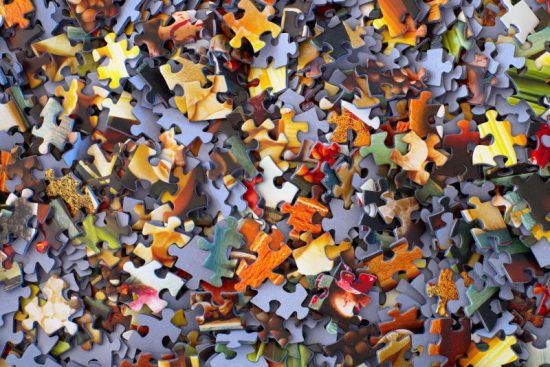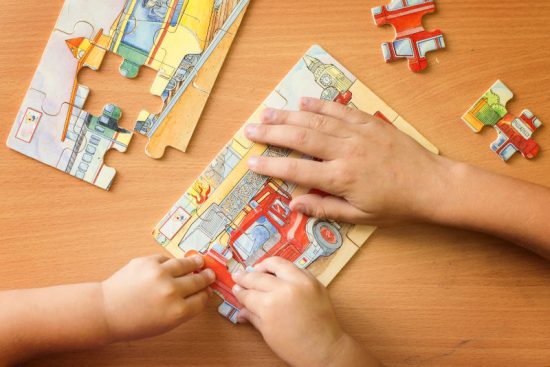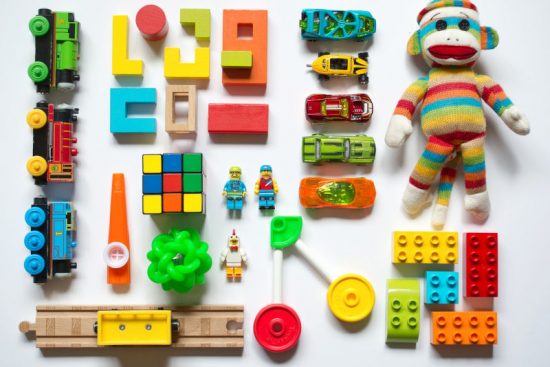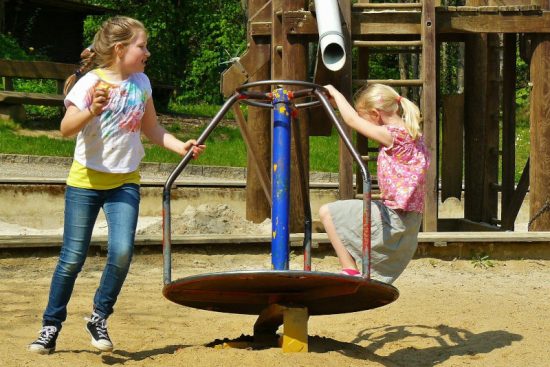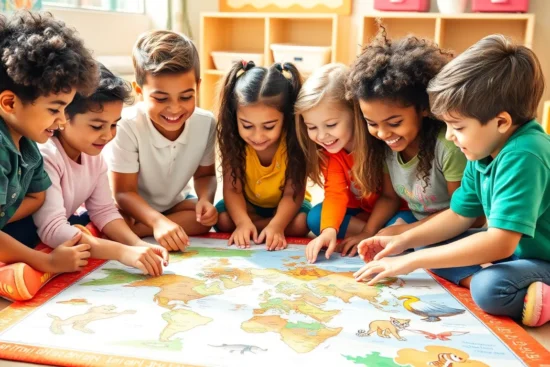
In a world where screens dominate attention spans, educational puzzles are the unsung heroes of learning. They sneak in knowledge while kids think they’re just having fun. Who knew that solving a jigsaw could sharpen critical thinking or that a crossword could boost vocabulary? It’s like hiding broccoli in a chocolate cake—everyone wins!
These engaging tools not only challenge the mind but also foster creativity and problem-solving skills. Whether it’s a math puzzle that feels more like a game show or a word search that turns into a treasure hunt, educational puzzles make learning feel like playtime. Dive into the world of educational puzzles, where the only thing more satisfying than solving them is watching the lightbulb moments as knowledge clicks into place.
Educational Puzzles
Educational puzzles are interactive tools designed to enhance learning while engaging children. These puzzles encompass various formats, including jigsaw puzzles, word searches, and crossword puzzles. Often viewed merely as toys, they hold significant educational value by fostering critical thinking and creativity.
Through solving these puzzles, children develop essential problem-solving skills that apply to real-life situations. Vocabulary development occurs naturally, as many puzzles introduce new words and concepts in a playful context. Additionally, educational puzzles stimulate curiosity, encouraging children to explore and discover.
Certain types of puzzles, like mathematics-based challenges, promote numerical reasoning. Others focus on science themes that expand knowledge in biology, geography, and physics. Games that integrate history foster an understanding of past events in an engaging manner.
Parents and educators often implement these puzzles in classrooms or at home. They serve as excellent tools for group activities, enhancing social skills through collaboration. Engaging with puzzles frequently results in improved focus and patience, as children work through challenges to achieve solutions.
Research indicates that puzzle-solving also enhances memory retention and cognitive development. These benefits make educational puzzles an essential component of childhood learning strategies. Ultimately, incorporating educational puzzles into daily routines enhances overall learning experiences, making education a more enjoyable journey for children.
Types of Educational Puzzles
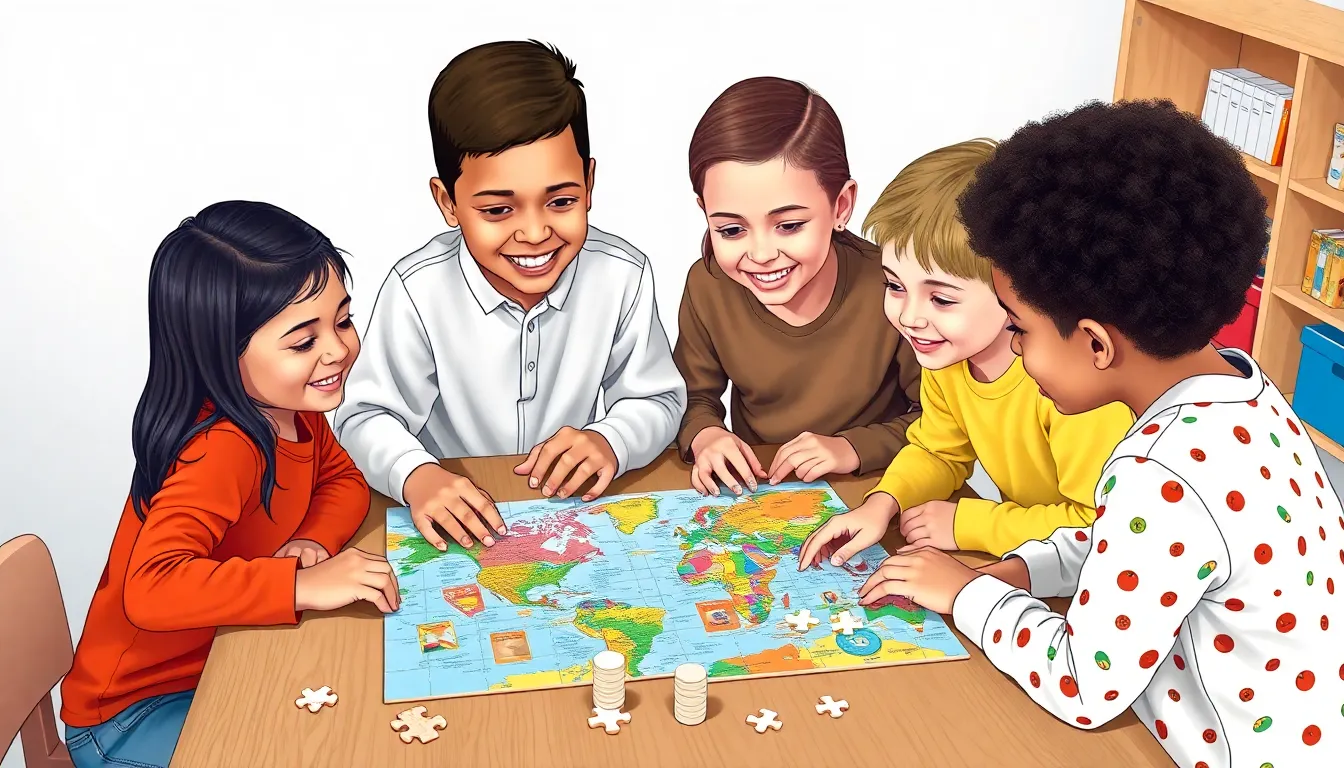
Educational puzzles come in many forms, each designed to promote learning and engagement. Different types cater to various skills and subjects, making them versatile tools for education.
Jigsaw Puzzles
Jigsaw puzzles enhance spatial awareness and critical thinking. Arranging pieces to form a complete picture requires visual perception and problem-solving skills. These puzzles often represent educational themes, such as geography, history, or biology, allowing children to learn while having fun. As kids fit pieces together, they also develop patience and attention to detail. Engaging with jigsaw puzzles creates opportunities for collaboration during group activities, promoting teamwork and communication. Parents often notice how children gain satisfaction from completing these challenges, adding to their learning experience.
Crossword Puzzles
Crossword puzzles focus on vocabulary and memory enhancement. These puzzles challenge participants to fill in words based on clues, reinforcing language skills and spelling ability. The variety of topics in crosswords allows for tailored learning experiences across different subjects, including literature, science, and pop culture. Children encounter new words and concepts, enhancing their understanding and retention. Additionally, crosswords can stimulate critical thinking and expand general knowledge. Using these puzzles in classrooms or at home encourages friendly competition and social interaction, making learning enjoyable.
Logic Puzzles
Logic puzzles promote reasoning and analytical skills. Solving these puzzles requires critical thinking to deduce answers from given clues. Formats include riddles, Sudoku, and pattern recognition challenges. These activities develop problem-solving abilities, essential for academic success and everyday situations. Children learn to approach problems methodically, enhancing their cognitive flexibility. Engaging with logic puzzles can foster a sense of accomplishment as kids solve each challenge, building confidence in their analytical skills. Educators frequently incorporate these puzzles into lesson plans, making them an effective tool for collaborative learning.
Benefits of Educational Puzzles
Educational puzzles provide numerous advantages that support children’s development and learning. They enhance creativity and critical thinking skills while making learning enjoyable.
Cognitive Development
Cognitive growth significantly benefits from educational puzzles. Engaging with these challenges fosters brain development, enhancing memory, attention, and spatial reasoning. Children who solve puzzles often exhibit improved analytical skills. Tasks like jigsaw puzzles require visual-spatial reasoning; these activities train the brain to recognize patterns and develop strategies. Research confirms that regular puzzle-solving can promote neural connections, boosting overall cognitive function. Exposure to various concepts through puzzles also broadens children’s understanding and retention of information.
Problem-Solving Skills
Problem-solving skills improve as children face and overcome challenges presented by educational puzzles. These activities encourage them to think critically and approach problems from multiple angles. Engaging in crossword puzzles helps reinforce vocabulary and contextual understanding, while logic puzzles develop reasoning abilities. Children learn to break down complex tasks into manageable parts, enhancing their approach to real-life problem-solving. Practicing this skill through puzzles builds resilience, allowing children to remain persistent when encountering obstacles.
Engagement and Motivation
Engagement levels rise dramatically when children interact with educational puzzles. These activities combine fun and learning, capturing their interest effectively. Puzzles encourage independent and cooperative play, making them ideal for group settings. The satisfaction from solving a puzzle fosters intrinsic motivation, prompting children to tackle new challenges. As they experience “lightbulb moments,” their enthusiasm for learning increases. Educational puzzles create a stimulating environment that inspires curiosity and a love for exploration.
How to Choose the Right Educational Puzzle
Choosing the right educational puzzle involves considering several key factors. Selecting a puzzle that aligns with a child’s age and ability enhances their learning experience significantly.
Age Appropriateness
Age appropriateness plays a crucial role in selecting educational puzzles. Puzzles designed for younger children typically feature larger pieces and simpler concepts. For instance, preschool-aged children benefit from bright colors and familiar shapes that encourage recognition. Meanwhile, puzzles for older children present more complex themes and ideas, fostering deeper cognitive skills. Choosing puzzles that fit within a child’s developmental stage ensures they remain engaged while learning effectively. It’s important to research age recommendations on puzzle packaging to make informed decisions.
Difficulty Level
Difficulty level is essential when choosing educational puzzles. Starting with puzzles that match a child’s skills promotes confidence and success. Novice puzzlers thrive on simpler challenges, as these can build foundational skills without overwhelming them. In contrast, advanced puzzlers seek greater complexity, such as multi-piece jigsaw puzzles or intricate word searches. Eyeing the number of pieces and the thematic complexity helps gauge a puzzle’s difficulty. Kids often display greater interest when challenges are appropriately calibrated to stretch their capabilities without frustration. Adjusting puzzle difficulty as a child progresses ensures continuous engagement and learning.
Popular Educational Puzzle Resources
Numerous online resources offer high-quality educational puzzles for various age groups. Websites like Education.com provide a wide array of puzzles designed to enhance different skills, from vocabulary to critical thinking. Teachers and parents can access printable worksheets and interactive games that cater to early learners and older children alike.
Scholastic features a diverse range of jigsaw puzzles and word searches that align with educational standards. Their resources often target specific subjects, making it easy to integrate puzzles into lesson plans. Engaging children in this way fosters deeper understanding and retention of material.
The PBS Kids platform includes educational games and puzzles that revolve around popular characters from children’s shows. This resource captures children’s interest by combining fun with learning. Through familiar faces, kids are motivated to practice new concepts while enjoying their favorite activities.
Another excellent option is National Geographic Kids, which offers puzzles focusing on geography and science. Children can explore different cultures and habitats through interactive jigsaw puzzles. These engaging formats spark curiosity and encourage exploration of complex ideas.
For those looking for mobile applications, Duolingo ABC incorporates engaging word puzzles and games to promote literacy among young readers. This app enhances vocabulary skills in a playful environment. The combination of reading and puzzle-solving makes learning enjoyable.
MindWare specializes in logic puzzles and brain teasers that challenge children’s reasoning skills. Offered across varying difficulty levels, these puzzles cater to a broad audience. Engaging with these problems encourages children to develop analytical strategies while having fun.
The variety of resources available ensures that parents and educators can find suitable options that match children’s learning styles and interests. Interactive puzzles not only entertain but also build essential skills that support academic growth. By utilizing these resources, educational puzzles can transform learning into a dynamic experience.
Conclusion
Educational puzzles are more than just entertaining activities; they’re essential tools for fostering a child’s growth. By engaging with these puzzles, children not only have fun but also develop critical skills that are vital for their academic and personal lives. The blend of play and learning offered by various puzzle types creates an enriching environment that encourages curiosity and resilience.
Choosing the right puzzle based on a child’s age and skill level is crucial in maximizing their educational benefits. With countless resources available, parents and educators can easily find puzzles that align with children’s interests and learning styles. Incorporating educational puzzles into daily routines can transform the learning experience into an enjoyable adventure that inspires a lifelong love for knowledge.

